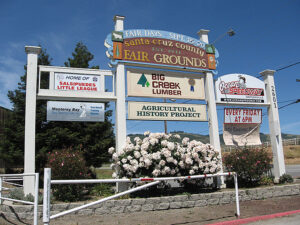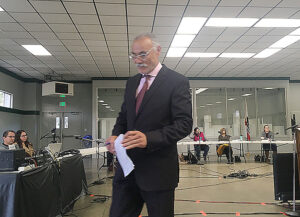By Jondi Gumz
The 1955 livestock barns at the Santa Cruz County Fair are not going to be demolished under the new regime in place since CEO Dave Kegebein was dismissed Oct. 4.
 On Dec. 6, the fair board, with new members Nick Colubaquib of Aptos and Rachel Wells of Felton, voted with board member and interim manager Don Dietrich and acting board president Stephanie Fontana abstaining, to rescind the motion to demolish and instead agreed to pursue repairs to engineered specifications with money proffered by Michael Flores, deputy director of the state Department of Food and Agriculture.
On Dec. 6, the fair board, with new members Nick Colubaquib of Aptos and Rachel Wells of Felton, voted with board member and interim manager Don Dietrich and acting board president Stephanie Fontana abstaining, to rescind the motion to demolish and instead agreed to pursue repairs to engineered specifications with money proffered by Michael Flores, deputy director of the state Department of Food and Agriculture.
“The state will step up,” Flores said. “No strings attached.”
An audit of the Santa Cruz County fair by that agency, which oversees operations at state-owned fair property, found no receipts for $163,442 in purchases and led to the dismissal of Dave Kegebein, who in 11 years had orchestrated a financial turnaround with $1.75 million cash on hand, albeit with omissions in record-keeping.
As in October, the fairgrounds meeting room was full, some calling for more transparency on the financials, which are behind schedule, and more watching on Zoom.
Flores, dressed in a suit, stepped to the microphone at the fair board meeting and said that state resiliency funding will pay for the repairs.
“We feel it’s prudent,” Flores said, acknowledging it would take time to come up with plans for a new multi-purpose building, as Kegebein had proposed and the board supported.
Kegebein, at the microphone, said resiliency funding was “widely perceived” as a plan to adapt fairgrounds for use by homeless people.

New Santa Cruz County fair board members Rachel Wells and Nick Colubaquib • Photo Credit: Jondi Gumz
Flores, responding to Kegebein, said, “He couldn’t be more wrong.”
Flores said resiliency funding is designed to upgrade heating and cooling systems at fairgrounds, which are needed in disasters such as earthquakes, fires, and flooding.
He said the money is also going to install commercial kitchens to provide meals to disaster victims and incubate startup food businesses, proper showers and broadband, and RV access.
“That’s what this money is meant for,” Flores said.
Some in the audience were unconvinced.
“We want no strings attached,” said Kevin Hurley, a volunteer who heads up the fair’s beef cattle department.
The barns were deemed unsafe by the state and cordoned off during the fair. Tents were put up for fair animals and their exhibitors.
Historic Mess
Dietrich, in his role as interim manager, said he got the impression from talking with CDFA and California Construction Authority (designed to facilitate construction projects at fairgrounds) that due to the historic designation, it would be easier to repair than demolish the barns.
Asked he could get the historic designation corrected, Dietrich said he tried to reach the county planning department, which oversees historic resources.
“They’ve been fairly unresponsive,” Dietrich said.
“If you need help, I’m available,” said fair board member Dana McRae, county counsel for 22 years before retiring.
“Our legal team can certainly help,” said Flores of CDFA.
The county Historic Resources Commission meets in January.
Board member Tony Campos said demolition was stalled because of “an honest mistake” designating the entire fairgrounds property as historic.
The intent had been to designate the Rodgers House, built in the 1870s, donated by Melanie Kett Wirtanen to the fairgrounds and moved there in 1998, as historic.
However, Wirtanen, who spoke, said she was “completely shocked” by the designation, which limits what can be done to the property.
Kegebein said the historic designation is by parcel and the fairgrounds is one parcel.
That explains why the historic designation was applied to the fairgrounds as a whole.
Fontana pointed out the access for fire trucks and trailers is difficult with the current setup. This is why she had favored pursuing a new multi-purpose building.
New Interim Manager
A new interim manager is coming on board Jan. 2.
He is Kelly Ferreira, who retired as San Benito County fair manger in 2013 after 27 years and has been working as a fair consultant since.
Recommended by staff at CDFA, Fontana called him well qualified.
Because of his retirement status, Ferreira will work three days a week at 60% salary.
His pay will be $99,060, which Dietrich said is 60% of what Kegebein was paid.
Dietrich said he would fill in on days Ferreira is not at work.
There were 7 yes votes, with Dietrich abstaining due to his dual role.
Betty Aboytes, who owns property next to the fairgrounds, said she appreciated being able to call on Dave Kegebein whenever she saw something amiss or the event music was too loud.
“I just need to know who to call,” she said.
Recruiting Permanent Manager
Dietrich recommended creating an ad hoc committee to recruit a permanent manager, and the board agreed.
Directors Dana McRae and Michael Pruger are on that committee.
Donna Steward, who has 24 years of experience, was hired as board secretary to take minutes at $37.50 per hour.
The financials for September and October are not yet ready, but the fairgrounds is booked for many weekend events.
Fairgrounds Shop Use
Dietrich explained, as he had promised, why he had used the fairgrounds shop to work on his own equipment. He said he had brought his tools to do fairgrounds repairs on a volunteer basis. When he needed to work on his own vehicle, he asked Kegebein if he could use the shop and Kegebein said it was OK.
Dietrich said he had repaired equipment of fair customers and staff and had notified CDFA.
“I like helping people,” he said. “I’m going to continue until I’m no longer needed.”
As for plans to repair leaks in the roof of the Harvest Building, Dietrich said it’s a work in progress. He hopes to have a report on Jan. 24.
•••
Future meeting dates: Jan. 24, Feb. 28, March 28, April 25, May 23, June 27, July 25, Aug. 22, Oct. 24, Dec. 5, all at 1:30 p.m. at the fairgrounds, 2601 E. Lake Ave., Watsonville. Meeting is also on Zoom. For agendas, see santacruzcountyfair.com.


